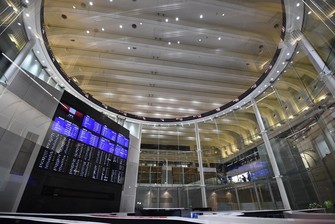Media Jepang
Tokyo stocks fall amid renewed US-China trade tensions
MAINICHI
| Kemarin, 18:15
1 0 0
0
TOKYO (Kyodo) -- Tokyo stocks fell Thursday, weighed down by weak semiconductor and technology shares amid rekindled worries about U.S.-China trade tensions.
The 225-issue Nikkei Stock Average ended down 666.18 points, or 1.35 percent, from Wednesday at 48,641.61. The broader Topix index finished 12.65 points, or 0.39 percent, lower at 3,253.78.
The U.S. dollar rose to the mid-152 yen level as the Japanese currency was sold on speculation that the Bank of Japan will not raise interest rates at its policy meeting next week, after Prime Minister Sanae Takaichi, a proponent of easy monetary policy, launched her government Tuesday, dealers said.
At 5 p.m., the dollar fetched 152.49-51 yen compared with 151.91-152.01 yen in New York and 151.82-84 yen in Tokyo at 5 p.m. Wednesday.
The euro was quoted at $1.1599-1600 and 176.88-92 yen against $1.1606-1616 and 176.36-46 yen in New York and $1.1600-1602 and 176.12-16 yen in Tokyo late Wednesday afternoon.
The yield on the benchmark 10-year Japanese government bond ended at 1.655 percent, up 0.005 percentage point from Wednesday, as the debt was sold, tracking a rise in long-term U.S. Treasury yields.
On the stock market, U.S.-China trade worries grew after reports that the administration of U.S. President Donald Trump is considering a plan to curb software-powered exports to China, sending heavyweight chip and tech issues lower, analysts said.
Investors also locked in gains following recent advances on optimism over the economic agenda of Takaichi, who is viewed as supportive of boosting fiscal spending to spur growth, brokers said.
"Moves to adjust positions were seen among chip shares and those related to artificial intelligence technology after the Nikkei climbed near 50,000 (on Tuesday) on hopes for the Takaichi government," said Wataru Akiyama, strategist in the Investment Content Department of Nomura Securities Co.
But with expectations for Takaichi's economic measures still high, the market's downside was supported by buying on dips, Akiyama said.
komentar
Jadi yg pertama suka


